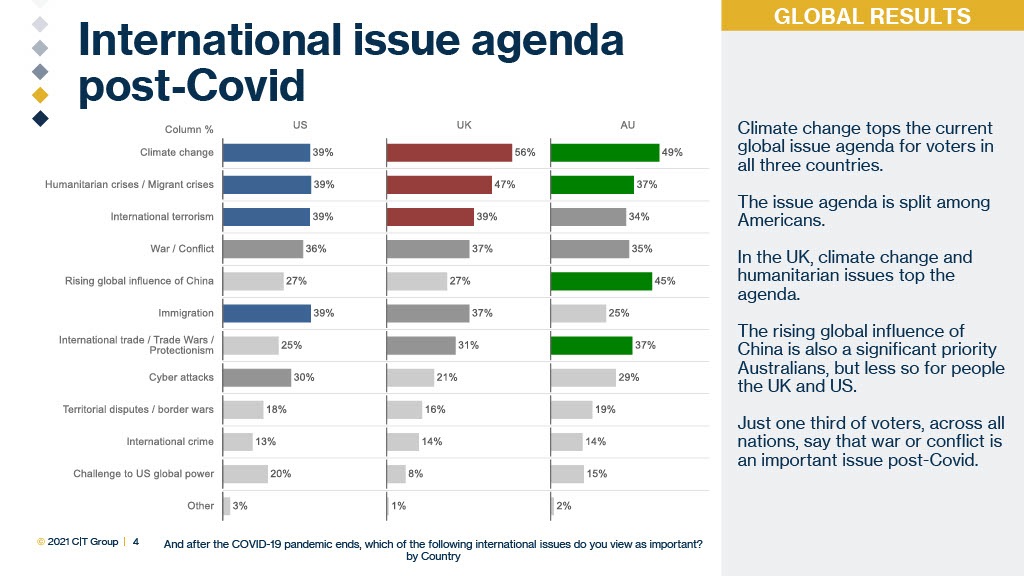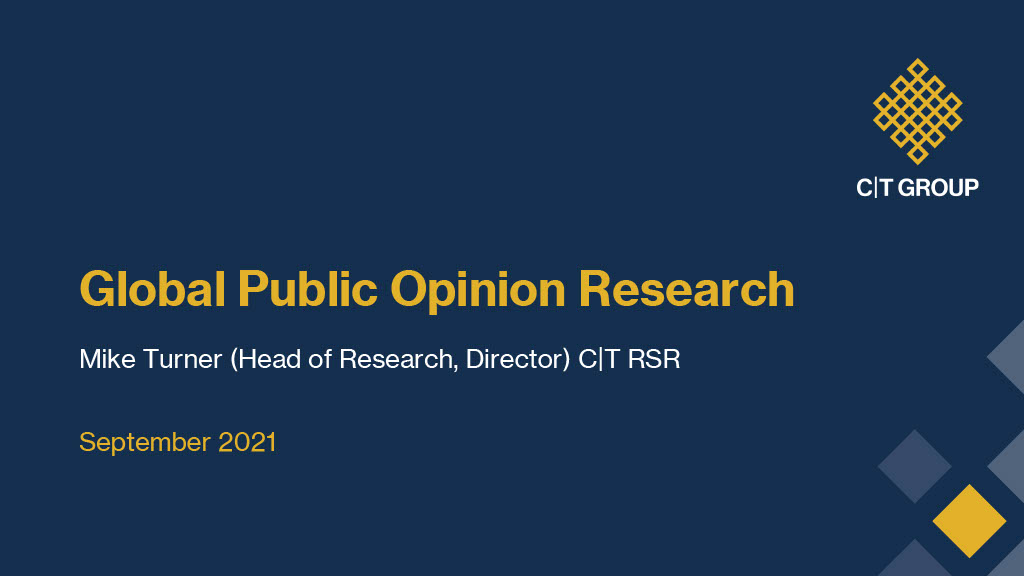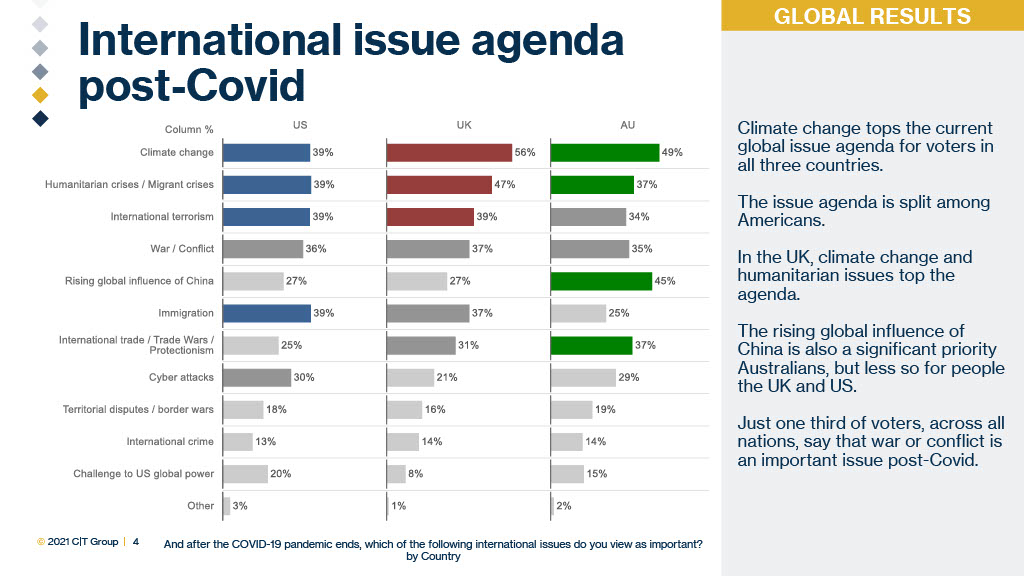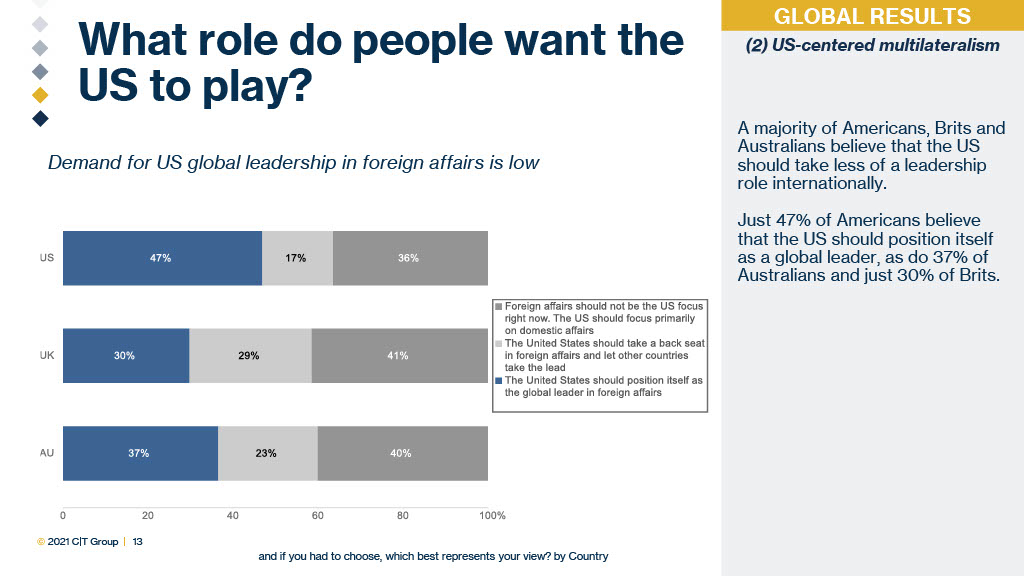AU / UK / US research finds support in Australia for strategic partnerships with the United States


The rise of China’s influence is one of the chief issues of concern to Australian voters when it comes to global affairs as the world starts to recover from the COVID-19 pandemic, according to international polling findings released today by research, campaigns and advisory firm CT Group.
(Detailed poll findings are at the foot of this page.)
Compared with British and American voters, Australians are more likely to say they expect a significant shift towards Chinese global influence over the coming decade. Australians have also expressed increased concern about the potential for global conflict.
The research, conducted between August 30 and September 3 in the US, UK, and Australia – after US troops departed Afghanistan but before the announcement of a plan for the US to share nuclear submarine technology with Australia – also found:
- 48% of Australians support partnering with the US on strategic defence matters, even at significant cost in defence spending, compared to 30% who say the country should prioritise domestic issues;
- while the US is still seen as being the world’s most influential power, only American voters say this will still be the case in 10 years. Around one-third of Australian and British voters expect China to be more influential by 2031;
- British and Australian voters are divided on whether the US is the most dominant military force in the world. At least 4 in 10 people say the US is either not the most dominant power, or can be outpowered by strategic competitors; and
- a significant minority of voters in all three countries (38% in the US, 42% in the UK and 43% in Australia) believe US power is in decline.
Awareness of the withdrawal from Afghanistan was extremely high in all three countries surveyed, with almost three-quarters (73%) of Australian voters saying they had seen footage from Kabul Airport as US troops departed the country.
Catherine Douglas, managing director of CT Group’s research and campaigns business in Australia, CT RSR, said: “Australians are more focused on the rising influence of China than they are about the risk of global terrorism arising as a consequence of the Afghanistan withdrawal.
“Although voters still view the US as the the dominant force in the world, Australians in particular do not see this lasting for long as China continues to flex itself in the region on trade and defence posture.
“On balance Australians support a partnership with the US on a strategic defence capacity, but is incumbent on our leaders to demonstrate how these relationships make us safer and that the resources are commensurate with the risk we face.
“The plan for Australia to acquire nuclear powered submarines as part of a wider push on security in the Indo-Pacific region sets an important backdrop to the impending meeting of ‘The Quad’ leaders in Washington. Broadly, Australians still back the US alliance, but it is evident that the level of conviction has begun to waver.
“For example, Australians are divided on whether the US is the world’s most potent global military, and Australians took a dim view of how the Biden administration handled the withdrawal from Afghanistan, even though the decision to pull US troops out of the country had strong support. So the renewed focus on how the US relationship can contribute to the security of Australia and the Pacific region comes at a critical time.
“Geography and trade relations naturally make the rise of China’s influence of greater concern to Australians than to British or American voters. Australians see trade tensions receding in importance over the coming decade but there is a perception of increased risk of an actual conflict.”
The polling was conducted in all three markets between August 3 and September three, with samples of 1,479 voters in Australia, 1,534 in the UK and 1,529 in the US. Data are weighted to reflect population-level factors and the maximum margin of error is +/- 3.0%.





























